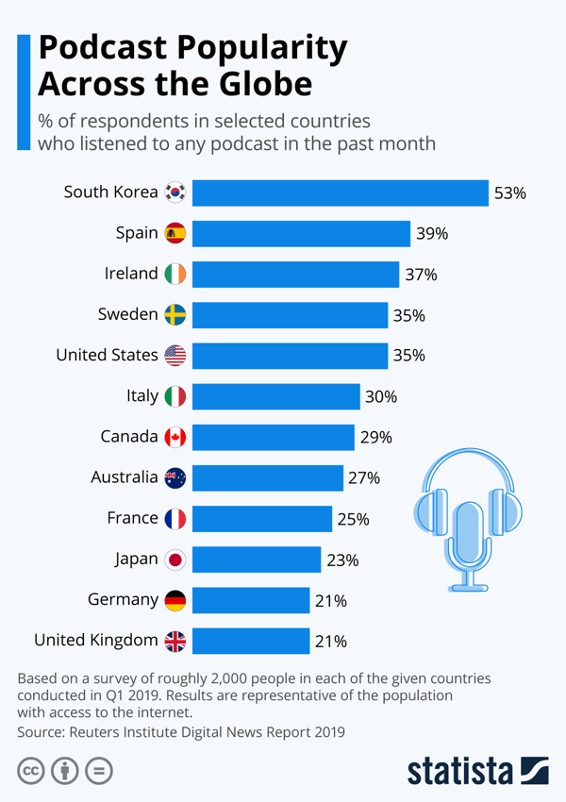Table of Contents
Podcasts: how and why to incorporate them into your marketing strategy
Podcasts are a highly effective tool for improving the image and authority of a brand and strengthening relationships with the audience. In this article, we’ll be looking at different podcast genres and how they’re distributed, the pros and cons of the introducing the format into a content marketing strategy and how podcasts can help you achieve your goals. We’ll then move on to the practical side of things and give you an overview of the equipment needed to record a podcast, as well as some tips for effective promotion. Ready? Let’s get started!
What is a podcast?
The term “podcast” is a marriage of iPod – the famous portable MP3 player introduced by Apple in 2001 – and broadcast and was coined by British journalist Ben Hammersley to encapsulate the possibility of publishing digital audio in MP3 format without having to use traditional radio channels.
Podcasts are audio content recorded and published periodically on the Internet, usually via a platform like iTunes or Spotify, with the goal of attracting a specific audience slice and building loyalty with it over time. Users can download (generally for free) and listen to them whenever they want on their computer or smartphone. Podcasts can be divided into different genres based on their content. We outline some of the most common below.
Educational podcasts can cover general interest themes like history or literature, or focus on more industry-specific subjects with the aim of increasing the skills and knowledge of professionals. Entertainment podcasts provide content on lighter and more fun topics, or tell stories (fictional podcasts).
Branded podcasts are programmes made by companies with the goal of building trust with listeners and communicating brand values through original content. They can cover all sorts of topics, but they should never too explicitly refer to a company’s products and services.
According to Statista, in recent years the number of podcast listeners has grown significantly worldwide (most likely helped by lockdowns) from 332 million in 2020 to an estimated 424 million in 2022.

Why chose a podcast for your marketing strategy?
What are the advantages of incorporating podcasts into your marketing plan?
First of all, this format can be played anywhere and at any time of day and enables listeners to learn more about a particular topic or keep themselves entertained while doing other things (travelling, commuting, working out, housework).
What’s more, voice is a powerful communication tool able to emotionally engage people and hold their attention. According to research by Spotify, two out of three users listen to podcasts attentively and 81% of listeners have taken action after listening to as podcast ad. Such actions include searching for the product online, following the brand on social media and sharing information about the company with other people.

This means of communication, so convenient and immediate while also being more intimate and engaging compared to others, therefore offers a unique opportunity to firms that wish to get closer to their target audience and improve their image through bespoke content.
On the other hand, making podcasts requires a significant investment in terms of time, skill, technology and human resources for editorial planning, recording and promoting episodes. It’s a strategy that takes passion, patience and dedication to achieve results that will only be seen in the medium to long term.
Our advice, then, is to prepare an editorial calendar and create a few pilot episodes to gauge audience reaction, before deciding to invest in making a complete series.
Podcast marketing: what it can achieve
Let’s see what type of results marketing podcasts can achieve:
- Brand awareness and brand reputation: audio content can help to improve an organisation’s visibility, authority and trust in the eyes of the audience.
- Driving engagement and conversations: building relationships with people based on fostering affinity and sharing content of value can bring them closer to the brand, encouraging them to interact with it through social media and buy its products and services.
- Building loyalty: podcasts can entertain and cement the loyalty of existing customers, thus making it more likely that they will make repeat purchases over the long term.
What do you need to record a podcast?
To begin recording your podcasts, you’ll need to get hold of:
- Software for recording audio
- A microphone (one per host/guest)
- Studio headphones (one set per host/guest)
- A mixer for connecting more than one microphone
- A pop filter for better sound quality
- Sound absorbent panelling to limit background noise

You can find starter kits online that include all you need to begin producing your show.
How to promote a branded podcast
Once you’ve recorded the first episodes of your podcast, how do you promote them? Here are some tips for giving visibility to content you’ve created.
Release regularly
Initially, we recommend releasing your first batch of episodes all at once to gain maximum visibility on iTunes and other platforms. You should then establish a schedule with a set day for dropping new episodes – for example, every Tuesday – so that your audience will always know when to find them.
Promote the podcast online and offline
Social media, ad insertion, newsletters, word of mouth: use as many channels as possible to spread the word and widen your audience.
Turn the podcast into a video
Add images to the recording and upload the video to your company’s YouTube channel: posting on the world’s second most popular social media platform will enable you to reach a bigger audience.

Transcribe the content
Add a transcription of some episodes to your company blog: not only will this improve the organic positioning of your blog, it will all also give you the opportunity to provide extra resources for the audience and include calls to action, such as inviting listeners to follow the show.
Invite guests
Depending on what the show’s about, consider asking customers, suppliers or industry experts to come onto the pod. This will allow you to tap into their network of followers and increase your listener base.
Foster relationships
Ask other podcasters to jointly host an episode with you and, of course, to promote it on their own podcast. You can also arrange interviews on other podcasts with representatives from your company: it’s an indirect way of attracting new listeners and improving the firm’s image.
We’re going to leave you with on last tip: as the podcast is a format designed to attract and entertain people, make the most of every tool available (email, online forms, social media) to constantly gather feedback from the audience and make improvements suggested by them.

